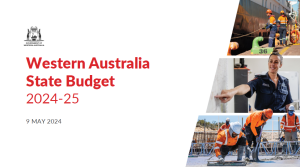Foreword
Many Western Australian households are facing hard times, unsure how they will see their way through the next year or two. They are worried about being able to provide for their loved-ones most basic needs and scared that no matter how hard they work and how carefully they scrimp and save, they may fall behind their financial commitments and risk losing everything.
The financial data is telling us that the worst is yet to come, with around a million Australian mortgagees coming off their fixed-term periods and facing a massive jump in their interest payments. For many households this is their first encounter with financial hardship – they have probably never engaged with social services before and may live in new suburbs where few support services are readily available. We saw during the global financial crisis that households will try to hang on too long before seeking help and dig themselves so deep into debt that the only outcome is bankruptcy and mortgage default.
For years our news has been filled with stories of the strength of the WA economy. Now many are looking around at rising rates of poverty, homelessness, poor mental health and family violence, and wondering how we got here. It feels like we have passed a tipping point – where average working households are struggling to get by. Too many people can’t find somewhere they can afford to rent or imagine ever owning their own home, while others now face the prospect of retiring into poverty.
Community services play a crucial role in supporting our society, helping people out when they are struggling and acting as a safety net that keeps our community functioning through difficult times. We write this submission to improve support for the most disadvantaged members of our community, and to support the work of the compassionate people who assist them.
WACOSS staff have spent the last couple of months talking with frontline service providers around the state. While the challenges facing each community have their own unique complexities of history, place and service mix, there are common and persistent themes. Across the state essential workers are feeling frustrated and exhausted and services are struggling to keep hold of or replace burnt-out staff. They report rising demand for support and increasing complexity of need during a period they are having to cut hours, levels of service and outreach. Regional services told us that when they finally recruit new staff, they cannot find somewhere they can afford to rent in town. Some services now source rental housing from their own reserves – only to have some new recruits pack up and leave when they cannot get a place in childcare.
Frontline workers are concerned that existing service models and systems are getting stuck and beginning to fail. Many of our crisis and transitional services, from youth homelessness through to women’s shelters, are reporting that they can no longer find safe, affordable and appropriate accommodation to transition into. They face the difficult choice of supporting clients beyond the period they are funded for or having to send them back into violent situations or into homelessness.
Rising service delivery costs during a period of capped funding and delayed program recommissioning has forced many services to cut back operating hours to a point where services are less effective and at risk of becoming unviable. Cutting service hours in regional crisis accommodation for homeless youth, or for women and children escaping family violence can mean those in imminent risk have nowhere safe to stay at night or over the weekend. Making these tough decisions in no-win situations leaves staff feeling burnt out and heart-broken.
Meanwhile, many of the services that usually act as the entry points to the acute system are reporting that they are having to hold and case-manage clients in crisis with complex needs for extended periods, simply because there are no crisis or acute services that can provide the specialist support needed as waitlist have blown out beyond 12 months.
While Western Australia’s population has grown rapidly over the last decade, our social infrastructure has not kept pace and is now buckling under the strain of increased demand, increased complexity and funding that has fallen behind the growing cost of service delivery. We need to ensure that in addition to offering workers a good job, we can also offer adequate housing and the foundations for a happy, healthy and safe life. To achieve this, we need to shift from a mindset that prioritises one-off investment in physical infrastructure for growth to one that provides population-based and needs-based funding to critical social systems and supports.
Western Australia needs to make much better use of our most precious resource – our people. This is a resource that will continue to grow and shine if we use it effectively, but is easily eroded by misuse and neglect.
As a community it is more effective if we prioritise access to in-time services that make a real difference to life outcomes, so we can reduce the growing cost of our emergency departments and crisis services. It is more effective to boost the capacity of established services and put existing staff whose hours have been cut back on full time, than to try to establish new ones. Providing more support for local and regional childcare services can increase the participation of women in our economy, tackle our critical skills shortages and invest in the next generation. Working smarter by better using data to target services that reduce need, and by giving individuals the tools and support that empowers them to find what they need to be happier, healthier and more productive. Investing in the systems and networks that turn around lives and communities.
All these things are achievable, and we have the collective knowledge and experience to make them happen, but we need to act wisely and dedicate resources at an appropriate scale.
The WA Government and community services sector have worked together in partnership over the last five years to develop and implement the State Commissioning Strategy. Together we have committed to a range of five and ten-year strategies tackling problems from homelessness to family violence, mental health to financial hardship. These collective efforts are showing real promise and now our biggest collective challenge is implementation. We need to see these strategies put into action and properly resourced to allow our growing state to thrive.
That is why we are calling for a Community Accord. A coming together to develop a shared vision across the WA Government, our public agencies, community-based services and Aboriginal organisations that commits to a shared set of goals and outcomes that builds a stronger future for all Western Australians.
Mark Glasson Louise Giolitto
President Chief Executive Officer
To read the State Budget Submission, click here.
To read the State Budget Submission Summary, click here.




